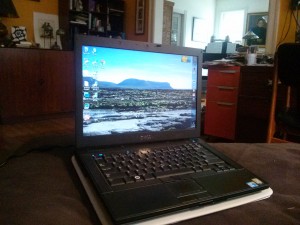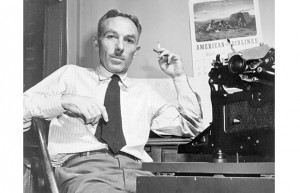 This is the computer I’ve had since 2010. It’s traveled the world–Catalunya, the Oregon Coast, Orkney–and it’s been my companion as I’ve traveled deep into my imagination. On this unassuming machine, I wrote three novels and began a fourth. This keyboard has transformed the images in my mind into letters and sentences and chapters. It has performed a sort of techno-alchemy–its careful combination of metal bits able to produce fiction, which is better than gold.
This is the computer I’ve had since 2010. It’s traveled the world–Catalunya, the Oregon Coast, Orkney–and it’s been my companion as I’ve traveled deep into my imagination. On this unassuming machine, I wrote three novels and began a fourth. This keyboard has transformed the images in my mind into letters and sentences and chapters. It has performed a sort of techno-alchemy–its careful combination of metal bits able to produce fiction, which is better than gold.
Of course, I’m the one producing the fiction, but like writers since the dawn of time, I require an instrument in order to get my ideas on to a page. Whether a chisel or a quill or a pen or a typewriter, the instrument holds a special place in the writer’s heart. And in the hearts of the readers who love their works. I have a photo in my office of Jane Austen’s writing desk. Last year, I saw Charles Dickens’ ink pot. Imagine if we had Shakespeare’s quill. The instruments people write with become important artifacts, but I don’t believe I’ve ever seen a computer in a display case, with a reverent label–“So-and-so wrote here”–and awestruck readers gathered round. The computer seems to be an unmagical writing instrument, one that doesn’t deserve reverence or awe.
 Yet, it’s the instrument (nearly) all writers use these days. This picture of E.B. White with his typewriter came up in a search of writers with their typewriters. Many similar photos of famous authors are scattered across the internet, but I didn’t find any pictures of writers with their computers. Perhaps the computer is too impersonal. The writer’s relationship with a pen, for instance, seems more intimate. You hold the pen, clutch it even. You grasp it in desperation. You stick it behind your ear or in your hair. You chew on it.
Yet, it’s the instrument (nearly) all writers use these days. This picture of E.B. White with his typewriter came up in a search of writers with their typewriters. Many similar photos of famous authors are scattered across the internet, but I didn’t find any pictures of writers with their computers. Perhaps the computer is too impersonal. The writer’s relationship with a pen, for instance, seems more intimate. You hold the pen, clutch it even. You grasp it in desperation. You stick it behind your ear or in your hair. You chew on it.
No one chews on a computer. But a laptop is a personal device. As I write this, I recline on a chaise lounge with my laptop on my lap. Some people use their laptops in bed. Many people are attached to their laptops and have difficulty leaving them behind. Like blankies or lucky coins, they bring them everywhere–to friend’s houses, to the pool, to Europe. So, at least with laptops, I don’t think the problem is that the computer is too impersonal.
I think the problem is that it is ephemeral. It lives only a short time. A writer might treat her favorite pen with great care and preserve it over many years. A typewriter might accompany an author throughout his career. And a chisel can outlive not only the prehistoric person who used it to carve out stories on stone, but that person’s entire civilization. A computer lives only a little while.
Four years to be precise. At Bucknell, we get new computers every four years. From a technology point of view, this is generous and wonderful. We are not burdened with slow, buggy systems. But from a sentimental point of view, it is a little sad. My laptop meets its end today. Tomorrow, a shiny new machine will greet me in my office. I will be grateful when I discover how fast it is. I will be grateful that I don’t have to restart it for no apparent reason at perplexing intervals. But I will not have written any novels on this new instrument. It will not yet have taken the stories in my head and shaped them into words and paragraphs and pages. But it will.
On my new laptop, I will revise A Sketch in Time and This Powerful Rhyme. I will continue to write The Story of the Stone. I hope I will write new books that haven’t yet formed themselves into ideas hovering at the back of my imagination. The new laptop will rest on my lap. It will come with me to Spain. And in four years, it will shut down and allow a newer, faster instrument to take its place.
We don’t keep our computers. We don’t cherish them. We don’t put them on display in museums or on websites. Perhaps we should.

